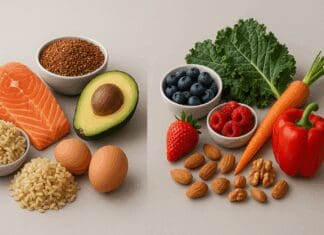Healthy Eating Habits
Developing sustainable healthy eating habits is crucial for long-term well-being. In the Healthy Eating Habits section, we focus on simple yet effective strategies for making nutritious choices that become second nature. From mindful eating and portion control to choosing whole foods, this guide provides practical tips to help you build lasting healthy eating routines that support weight management, improve digestion, and boost energy levels.
In an age of accelerating medical advancements and wellness trends, one enduring truth remains clear: nutrition is the cornerstone of lasting health and vitality. While there are countless debates about dietary styles—vegan versus keto, intermittent fasting versus small frequent meals—what transcends these distinctions is the underlying principle that nutrition fuels the body and mind. Understanding why is nutrition important means recognizing its role not only in disease prevention but also in optimizing energy, enhancing mood, supporting cognition, and sustaining cellular renewal throughout every stage of life.
In the modern world of health optimization, dietary choices are often framed in terms of popular superfoods, calorie tracking, or the newest diet trends. Yet the most fundamental question still eludes many: what are the 2 categories of nutrients, and why does this distinction hold such power over our health outcomes? Understanding this essential classification is the cornerstone of nutritional science and the bedrock of all dietary decisions, from the food pyramid to personalized eating plans. Nutrients are not arbitrary classifications—they are biochemical tools that serve highly specific and indispensable roles in the body. Recognizing these roles allows individuals to eat not only for satisfaction or tradition but for true physiological support.
Achieving vibrant, long-lasting health requires more than occasional self-care or sporadic exercise—it demands intentional daily nourishment that aligns with a woman’s unique biological and lifestyle needs. In this context, focusing on essential nutrition tips to support womens daily health goals becomes not just a matter of dietary choice but a strategy for sustaining energy, mood, hormonal balance, and long-term disease prevention. The human body—particularly the female body—requires specific nutrients in particular ratios to function at its peak across every stage of life, from menstruation and pregnancy to menopause and beyond. Whether you're a college graduate entering the workforce or a seasoned professional balancing career, family, and personal ambitions, adopting the right nutritional strategies is critical for mental clarity, immunity, reproductive health, and vitality.
At the heart of every healthy lifestyle lies a foundational principle that is often misunderstood or overlooked: balanced nutrition. In a society increasingly dominated by ultra-processed foods, quick-fix diets, and conflicting dietary advice, many individuals struggle to make informed choices that support both immediate vitality and long-term health. The concept of balanced nutrition, however, offers a science-backed framework for creating sustainable eating patterns that nourish the body, support cognitive function, reduce disease risk, and foster overall well-being. Far from being a rigid set of rules, balanced nutrition is an adaptable and empowering approach to food—one that respects bioindividuality, cultural diversity, and changing life stages.
In the pursuit of better health, increased energy, and chronic disease prevention, one of the most effective tools at our disposal is understanding and meeting our nutritional daily requirements. These requirements represent the foundation of our biological needs—ensuring the body receives the precise amount of nutrients needed to function, repair, and thrive. Without an informed understanding of daily nutritional needs, individuals are more likely to fall into dietary patterns that may be insufficient, unbalanced, or even harmful in the long term. Whether the goal is to support brain function, strengthen immunity, promote muscle growth, or simply feel better day to day, aligning your diet with these core nutrient benchmarks is crucial.
In an age where food choices abound and dietary trends shift with dizzying speed, the value of understanding the nutrition definition becomes not just relevant but essential. Knowing what nutrition really means—beyond calorie counts or fad diet rules—lays the foundation for making smarter, more intentional choices about what we eat. Nutrition is not merely about eating less or following rigid plans; it’s about equipping the body with the necessary building blocks to sustain life, prevent disease, and optimize function. To truly embrace healthy eating habits, we must first demystify what we mean by “nutrition” and examine how this understanding can empower better daily decisions. This comprehensive guide will unpack the key principles of nutrition from a biological, psychological, and practical lens, offering expert insights into how knowledge translates into lifelong well-being.
Understanding the critical role of iron in women’s health begins with recognizing how this essential mineral supports everything from oxygen transport to hormonal balance and immune function. For many, discussions around nutrition focus on calories, vitamins, or trendy superfoods, often overlooking the foundational importance of maintaining healthy iron levels. Yet for women—particularly those in their reproductive years, during pregnancy, or as they age—iron needs are both unique and deeply consequential. This article delves into the vital nutrition facts every woman must know about the normal range for iron in women, exploring the science, statistics, and strategies that can help support long-term health and well-being.
The question of “is it okay to eat” certain common foods every day has moved beyond casual curiosity into a subject of intense interest for both consumers and nutritionists alike. In a world where dietary guidance can change overnight, many individuals are left wondering whether their daily food routines are helping or harming their health. From bananas and eggs to bread and yogurt, the foods we regularly consume hold a complex mix of benefits and potential drawbacks. At the heart of this exploration lies the science of dietary frequency—how often we eat specific foods and how that rhythm aligns with our nutritional needs, metabolism, and long-term health outcomes.
In the realm of nutrition, the concept of a balanced plate of food transcends mere dietary guidelines; it embodies a holistic approach to health and well-being. A balanced plate of food is not just about satisfying hunger; it's about nourishing the body, supporting metabolic functions, and preventing chronic diseases. This approach emphasizes the importance of variety and proportion in our meals, ensuring that we receive a comprehensive array of nutrients essential for optimal health.
In an era where wellness trends come and go, one principle remains constant: the foundation of lasting health is built upon your daily eating habits. These patterns shape more than just your weight—they influence your energy levels, mental clarity, disease resistance, and even emotional wellbeing. While fads may promise quick fixes, genuine transformation is born from consistent, mindful, and science-backed choices. When we talk about eating habits, we refer not only to what you eat, but also how, when, and why you eat. Understanding this deeper relationship with food is essential for cultivating a sustainable lifestyle that nourishes both the body and mind.












